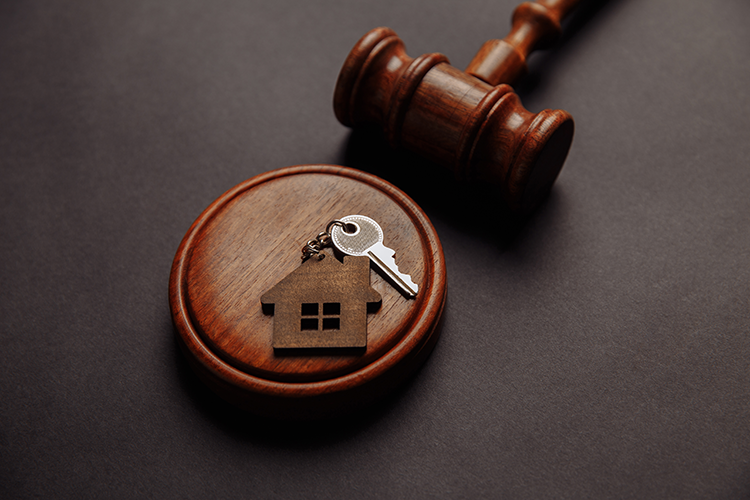10 guidelines to aid tenants and landlords in eviction crisis are adopted by the ABA House

Image from Shutterstock.
The House of Delegates approved a measure adopting the ABA 10 Guidelines for Residential Eviction Laws at the ABA Midyear Meeting on Monday.
Resolution 612 urges all legislative and governmental bodies to implement the guidelines, which were developed by the Standing Committee on Legal Aid and Indigent Defense to improve the experiences and outcomes of tenants facing eviction.
In introducing the resolution, Judge Bryant Yang of the Los Angeles Superior Court, who chairs SCLAID, said more than a half million Americans were unhoused in 2020, and even more are at risk of homelessness because of the COVID-19 pandemic. These guidelines, which he said are supported by several entities and notably not opposed by the Section of Real Property, Trust and Estate Law, seek to “make the procedures and laws around eviction fairer and more equitable.”
Yang added that the resolution “does not call for a moratorium” or “preclude evictions in appropriate circumstances.”
SCLAID recommends the following in its 10 guidelines:
- Tenants should receive reasonable notice of any breach of their lease and the chance to correct the problem before they face eviction.
- Courts should provide emergency procedures to tenants who have been locked out or unlawfully excluded from their homes.
- Tenants should not be evicted without the opportunity to present their defense in a hearing before a judicial officer with appropriate legal training.
- Tenants facing eviction should receive ample opportunity to prepare for their hearing, including through formal discovery.
- Courts should require landlords and tenants to participate in eviction diversion programs before litigation.
- Tenants facing eviction should have access to qualified counsel in all proceedings.
- Tenants facing eviction for nonpayment of rent should be able to maintain their housing by paying the full amount owed to their landlord before a final judgment.
- Tenants should be able to appeal an eviction judgment without facing undue bond requirements.
- Tenants should not be evicted, or not receive the chance to renew their lease, absent a good cause.
- Courts should seal the names of defendants before a final judgment in eviction cases as well as when eviction cases are dismissed and have additional procedures for protecting the privacy of defendants who can demonstrate good cause.
According to data from the Eviction Lab at Princeton University, which is cited in the report accompanying the resolution, an average of 3.6 million eviction cases were filed annually between 2000 and 2016. Of those cases, about 1.5 million resulted in eviction judgments each year.
Data from the U.S. Census Bureau, which is also included in the report, shows how the COVID-19 pandemic exacerbated the country’s eviction crisis. As of mid-August 2021, more than 8 million tenants were behind on rent. By January, that number had increased to nearly 10 million tenants.
Wendy Mariner, a Section of Civil Rights and Social Justice representative to the House of Delegates, also spoke in favor of the resolution. She contended that eviction disrupts the lives of both tenants and landlords. On the tenant side, she said individuals often need to leave their neighborhoods, move their children to a different school and face an increased risk of contracting COVID-19.
She called the guidelines “common-sense standards for preventing unnecessary evictions,” and in particular, focused on the significance of requiring landlords and tenants to participate in pre-litigation diversion programs.
“They can create ways to pay past-due rent, to connect people with social services if needed, they help the tenant find suitable housing,” Mariner says. “They can work best when done before an eviction proceeding is begun, and this is one of the most important contributions of the guidelines.”
Follow along with the ABA Journal’s coverage of the 2022 ABA Midyear Meeting here.
Jeremy Burkhart, a delegate-at-large from Ohio, spoke in opposition to the resolution. He told the House he had been both a tenant and a landlord and characterized the guidelines as “grossly unfair to landlords” and “not rooted in reality.”
“The truth is that today the tenant holds the balance of power in the landlord-tenant relationship,” Burkhart said.
Yang, when given time to respond to Burkhart, reiterated that the guidelines benefit both tenants and landlords by limiting and mitigating litigation costs.
Resolution 612 is co-sponsored by the Section of Civil Rights and Social Justice, Commission on Domestic and Sexual Violence and Commission on Homelessness and Poverty.
With its adoption, the ABA and its relevant committees can provide guidance to legislatures and advocates on how to ensure tenants facing eviction are afforded a reasonable level of due process, the report says.
The ABA has long advocated for protecting tenants’ rights and ensuring due process in judicial proceedings that involve housing.
Among its efforts, the House of Delegates approved a resolution in 2017 that called on governments to enact legislation that prohibited “discrimination in housing on the basis of lawful source of income.”
See also:
ABAJournal.com: “Volunteer legal work needed for pending evictions crisis, says ABA president”
ABA Journal: “Meet a health justice advocate working to prevent evictions during COVID-19 pandemic”
ABAJournal.com: “An eviction crisis is coming, housing lawyers warn”
Write a letter to the editor, share a story tip or update, or report an error.


